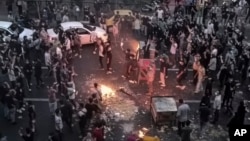Documents apparently hacked from an Iranian government database and published exclusively by VOA's Persian Service have shed new light on how Iran's Islamist rulers covered up casualties from violent crackdowns on mostly peaceful mass protests and falsely labeled them as riots in recent years.
VOA received the documents on March 6 from the hacking group Edalat-e Ali, which last month began exposing what it said were confidential Iranian governmental records that it obtained from breaching the judiciary's computer system.
VOA Persian reviewed the documents and deemed them authentic but could not verify their veracity independently because it is barred from operating in Iran.
Iran's United Nations mission in New York did not immediately respond to a VOA request for comment emailed Friday. Tehran has responded to past leaks of purported Iranian government documents by dismissing them as fake.
One document from the latest Edalat-e Ali leak appears to be from a November 25, 2019, meeting of Iran's Supreme National Security Council, which is overseen by Supreme Leader Ayatollah Ali Khamenei.
It characterizes Iran's mostly peaceful nationwide anti-government protests of November 2019 as stemming from "disruptive and riotous behaviors." The U.S. State Department has said Iranian security forces used lethal force to suppress the protests, killing about 1,500 people.
Some people involved in the November 2019 protests damaged public buildings and businesses.
The Iranian government repeatedly has used the term "riots" to describe mostly peaceful popular protests of its authoritarian Islamist rule in recent years.
The Supreme National Security Council document directed state media, the judiciary and other government agencies to "prohibit" the release of "any information regarding the number of fatalities" from the 2019 protest crackdown and to hold offenders accountable for disseminating "classified information."
The document also directed government agencies to pursue legal actions against "rioters" accused of killing protesters, saying that in such cases, it would be "appropriate" to conduct investigations, offer condolences to families of victims, and provide media coverage.
A second leaked document from Edalat-e Ali relates to an apparent September 26, 2022, meeting of the Iranian Interior Ministry's National Domestic Security Council. The meeting came 10 days after the eruption of nationwide anti-government protests over the September 16, 2022, death in morality police custody of 22-year-old Iranian Kurdish woman Mahsa Amini.
The document indicates that the National Domestic Security Council directed government agencies including state broadcaster IRIB to "counter" what it described as the "oppositional media narrative" of the protests by emphasizing "discourse supporting the Islamic revolution."
The National Domestic Security Council said protesters should be classified as "rioters" and associated with groups linked to acts of violence resulting in deaths. It also urged state television to prioritize broadcasting footage of incidents labeled as "violent actions by rioters" against police and civilians.
The U.N. special rapporteur on the situation of human rights in Iran, Javaid Rehman, has reported that Iranian authorities killed at least 520 people in the crackdown on the Amini protests.
Several men who participated in the protests were convicted of murder by Iranian authorities after what rights activists said were sham trials based on forced confessions. Their subsequent executions sparked condemnations from Western governments and international human rights organizations.
This article originated in VOA's Persian Service. Click for the original version of the story. Michael Lipin of VOA's NewsCenter contributed.




